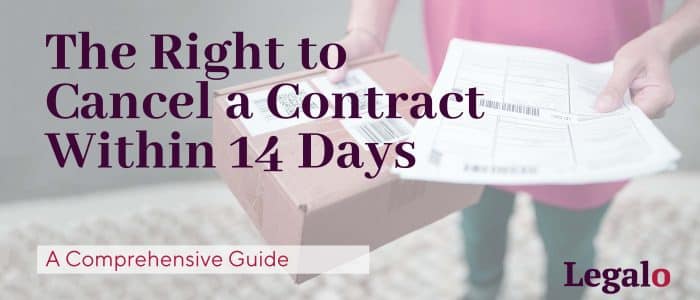Cooling Off Period – Cancel a Contract Within 14 Days
Stephen Avila
Understanding your right to cancel a contract within 14 days is crucial for making informed purchasing decisions and protecting your consumer rights.
We’ve written this guide to provide a comprehensive explanation of the 14-day cancellation right that applies to all contracts ‘concluded at a distance’ by a consumer. See below for an explanation of what ‘concluded at a distance’ means.

The right to cancel is designed to act as a ‘cooling off’ period and provide the purchaser with an opportunity to change their mind.
It’s important to note that under the law consumer purchaser can change their mind for any reason.
For the 14-day cancellation right to apply two conditions must be initially met:
- The purchaser must have made the purchase in the capacity of a ‘consumer’. This means that the purchase must not have been carried out as part of a business activity.
- The contract for the purchase must have been concluded at a distance. This means that the sale must not have been completed in person. Examples of ‘distance contract’ situations include goods or services bought online, via mail order, or via the telephone.
Understanding the 14-Day Cooling-Off Period

The 14-day right to cancel is set out in the Consumer Contracts (Information, Cancellation and Additional Charges Regulations 2013 (the “Consumer Contracts Regulations”).
Yes, the full title of the Consumer Contracts Regulations is quite a mouthful!
The Consumer Contracts Regulations specifically cover cancellation rights and information that must be provided to a consumer concerning the cancellation right.
The Consumer Contracts Regulations are often confused in online guides with the Consumer Rights Act 2015 (the “Consumer Protection Act”).
Note that The Consumer Protection Act is a separate piece of English law that provides a much wider range of consumer protection rules. For example, goods and services must be of a satisfactory standard.
During the 14-day cancellation (or cooling off) period, a consumer can cancel their order for any reason. It is not necessary that the goods or services are faulty. This is very applicable to goods and services bought online, and one of several key website legal requirements.
This 14 day cooling off period is designed to protect consumers who purchase goods or services online, over the phone, or via mail order. It gives consumers a 14 day opportunity to reconsider and potentially cancel services, or return the purchased items.
When Does the Cooling-Off Period Start?

Different rules apply to when the cooling-off period starts depending on whether goods or services have been purchased.
Cooling-Off Period for Goods
For goods purchased at a distance, the 14-day cooling period starts from the date the customer takes ownership of the goods.
Ownership of the goods takes effect when the trader safely delivers the goods.
The purchaser can cancel the goods at any time from the moment they take ownership of the goods up to 14 days from the date they take ownership (I.e. the goods are safely delivered).
Example: You bought a new pair of headphones online, and the seller delivered them to you on June 1st. In this scenario, you would have until June 15th to decide whether you want to keep the headphones or cancel the purchase and return them for a refund.
Cooling-Off Period for Services
For services purchased at a distance, the 14-day cooling-off period starts the day after the customer completes the purchase.
Example: You signed up for a gym membership over the phone on June 1st. The cooling-off period begins on June 2nd, and you have until June 16th to cancel the contract if you change your mind.
The Right to Cancel a Contract within 14 days (Information Requirements)
The Consumer Contracts Regulations require that a seller of goods and services to which the regulations apply must inform the purchaser of their cancellation right.
The Regulations state that this information must be provided in a clear and comprehensible manner.
If a seller does not advise the purchaser of the cancellation right, then the Regulations extend the cancellation period beyond 14 days. The cancellation period extends to 14 days from the date the seller notifies the purchase of the cancellation right if the seller did not advise the purchaser at the time of the purchase.
It is common to find details of the 14 day cancellation right in the business terms and conditions of the seller. Where they are an online business the cancellation right is often set out in their website terms of use.
How to Cancel Goods during the Cooling-Off Period
To cancel a contract for goods during the cooling-off period, the purchaser must notify the seller within 14 days of taking ownership of the goods.

The most reliable method is to send an email so that you have a written record.
If you are unable to cancel the goods in writing, i.e. via email, and can telephone. If you call the purchaser to cancel, take note of who you spoke with and what you agreed, then follow up with a letter or email.
After notifying the seller of your cancellation, you have an additional 14 days to return the goods.
The seller must refund the cost of any standard delivery charge that you paid when you purchased the goods. However, you’ll usually have to pay for the return postage.
The only situation where you can claim any return postage is where the seller did not advise you prior to the purchase of the liability to pay for any return postage.
Keep in mind that most online retailers will include this kind of information in their terms and conditions of sale.
How to Cancel Services during the Cooling-Off Period
It is easy to make use of the right to cancel a contract within 14 days.
To cancel a service contract during the cooling-off period, notify the seller within 14 days of entering into the contract.
As with goods, it’s best to do this via email for a written record.
If you call, document the conversation and follow up with a letter or email to confirm the cancellation.
If you paid a deposit, you should get it back.
However, if the service started at your request during the cooling-off period, the seller will keep what’s necessary to cover the costs of services provided up until the cancellation.
This could mean that they make deductions for administrative tasks or any part of the service already provided to you, for example.
Example: You hired a landscaping company to redesign your garden and paid them a deposit. With your agreement, they started the work during the cooling-off period. If you decide to cancel the contract, the landscaping company can retain a portion of the deposit. This would be to cover the work completed and any materials purchased.
Cancelling Digital Content within the Cooling-Off Period
The Consumer Contracts Regulations treat digital downloads differently.
If you purchase and download digital content within 14 days of purchasing it, the seller will require that you give your consent to waive the 14-day cooling-off period.
If you don’t provide consent, is likely that you won’t be able to download the content until the 14-day cooling-off period has ended.
This is to prevent you from changing your mind after you have downloaded the content. The seller can do this. This position only applies to downloadable digital content.
Example: You purchased an e-book online, and you want to start reading it immediately. By agreeing to waive the cooling-off period, you will lose your right to cancel the contract and get a refund once you download the e-book.
Exceptions to the Cooling-Off Period
The 14-day cooling-off period does not apply to everything. The Consumer Contracts Act sections 6 and 28 list specific exceptions to the right to cancel a contract within 14 days.
However, note that the information requirements do still apply. This means that a seller must advise the customer that the cancellation does not apply because the regulations exclude the goods or services.

Section 7 of the Consumer Contracts Act lists certain goods and services to which the Consumer Contracts Act does not apply.
We cover both the Section 6 and Section 28 exceptions and the Section 7 exclusions below. There are quite a lot of exceptions here, so read the lists carefully.
Exceptions for Goods
The right to cancel a contract within 14 days does not apply to the following goods:
- Prescription medications and medical supplies;
- Items that deteriorate quickly, like vegetables or flowers;
- Personalised goods, or goods made to customer-specific requirements;
- Sealed CDs, DVDs, or software products, if you break the seal on their wrapping;
- Goods that after delivery become inseparably mixed with other goods;
- Goods that are sealed where unsealing could give rise to health and safety issues. For example, makeup;
- Contracts that include a specific date for their performance and which relate to the supply of accommodation, transport of goods, vehicle rental services, catering or services related to leisure activities;
- Contracts concluded at auction;
- Alcoholic beverages (subject to certain caveats);
- Goods where the price may fluctuate during the cancellation period;
- The milkman exception: foodstuffs, beverages or other goods for current consumption in the household which a trader supplies on frequent and regular rounds to the consumer’s home, residence or workplace; or
- Houses (see the exception in the services section below regarding the creation of immovable property or of rights in immovable property).
Exceptions for Services
You don’t get a cooling-off period if you arranged a service with a company in-store or on its premises.
Additionally, there’s no cooling-off period for:
- Passenger transport services (such as airline or train tickets);
- Booking a hotel room or rental of accommodation for residential purposes;
- Renting a vehicle;
- Transporting goods, including courier services;
- Catering or leisure activities for specific dates like hotel and restaurant bookings. Also theatre tickets, and catering for significant events like weddings or birthday parties;
- Requests for urgent repairs and maintenance;
- Some financial products and services (services of a banking, credit, insurance, personal pension, investment or payment nature);
- Gambling within the meaning of the Gambling Act 2005(7) (which includes gaming, betting and participating in a lottery) or, in relation to Northern Ireland, for betting, gaming or participating lawfully in a lottery within the meaning of the Betting, Gaming, Lotteries and Amusements (Northern Ireland) Order 1985;
- The creation of immovable property or of rights in immovable property (effectively including buying houses and investing in property);
- For the construction of new buildings, or the construction of substantially new buildings by the conversion of existing buildings;
- Package travel, package holidays and package tours (within the scope of Council Directive 90/314/EEC of 13 June 1990); or
- Timeshare, long-term holiday product, resale and exchange contracts (within the scope of Directive 2008/122/EC of the European Parliament and of the Council).
Actionable tip: Always check the cancellation period for these services before committing to them.
Exclusions to Consumer Contracts Regulations
The Consumer Contracts Regulations exclude certain categories of goods and services from the application of the cooling-off period. These are the contracts that are:
- concluded by means of automatic vending machines or automated commercial premises;
- concluded with a telecommunications operator through a public telephone for the use of the telephone;
- concluded for the use of one single connection, by telephone, internet or fax, established by a consumer; or
- under which goods are sold by way of execution or otherwise by authority of law.
Taking Ownership of the Goods and Exceptions
Taking ownership of the goods means that the trader has safely delivered the goods to you, or to a nominated neighbour, or to a safe place.
If the seller delivers your parcel to a nominated safe place or neighbour, the seller can treat this as having delivered the parcel to you.
The 14-day cooling-off period starts from the date of safe delivery.
Exceptions for Taking Ownership
If the delivery company leaves your package somewhere without your consent and you don’t find it for several days, contact the retailer. Explain when you actually received the goods. In this situation, it won’t count as safe delivery.
In this situation, your 14-day cooling-off period will start from the day you found and safely took ownership of the goods.
Example: The delivery company dropped your package over your fence without your consent, and you discovered it three days later. Contact the retailer and inform them of the situation. Your 14-day cooling-off period will start from the day you found the package.

Understanding your right to cancel a contract within 14 days is essential for making informed decisions as a consumer.
Knowing the rules and regulations surrounding the right to cancel a contract within 14 days is important. You’ll understand the cancellation process for goods, services, and digital content. As well as the exceptions to the cooling-off period. You can then confidently navigate and enforce your rights.
So many shoppers make purchases online. So it is critical that both consumers and retailers understand how the 14-day cancellation right works.
Website owners selling online should also familiarise themselves with the legal requirements for a website.
Always remember to check the specific terms and conditions of any purchase. Be aware of the cancellation policies to avoid potential complications.
Get Legal & Compliance tips straight to your inbox, free!
"*" indicates required fields
